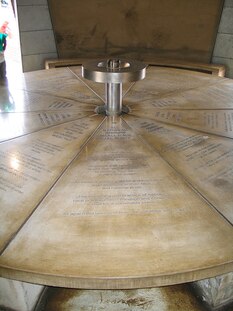 A Memorial in Klipstown, South Africa, engraved with the Freedom Charter (Photo by Joonasl, CC BY-SA 3.0
A Memorial in Klipstown, South Africa, engraved with the Freedom Charter (Photo by Joonasl, CC BY-SA 3.0 After about a decade of multi-faceted resistance to white minority rule, and in the wake of the Defiance Campaign of 1952, the work to create the Freedom Charter was in part a response to an increasingly repressive government which was bent on stamping out extra-parliamentary dissent. In 1955, the ANC sent out 50,000 volunteers into townships and the countryside to collect "freedom demands" from the people of South Africa. This system was designed to give all South Africans equal rights. Demands such as "Land to be given to all landless people", "Living wages and shorter hours of work", "Free and compulsory education, irrespective of colour, race or nationality" were synthesized into the final document by ANC leaders including Z.K. Mathews, Lionel "Rusty" Bernstein, Ethel Drus, Ruth First and Alan Lipman (whose wife, Beata Lipman, hand-wrote the original Charter).
The Charter was officially adopted on Sunday 26 June 1955 at a gathering of about 3,000 people, known as the Congress of the People in Kliptown, Soweto. The meeting was broken up by police on the second day, although by then the Charter had been read in full. The crowd had shouted its approval of each section with cries of "Africa!" and "Mayibuye!" ("may it return!"). Nelson Mandela escaped the police by disguising himself as a milkman, as his movements and interactions were restricted by banning orders at the time.
The document signified a major break with the past traditions of the struggle; this was no longer a civil rights movement seeking to be accommodated in the existing structures of society, but called for a fundamental restructuring of all aspects of South African society. The document is notable for its demand for and commitment to a non-racial South Africa, and this has remained the platform of the ANC. As a result, ANC members who held pro-African views left the ANC after it adopted the charter, forming the Pan Africanist Congress. The charter also calls for democracy and human rights, land reform, labor rights, and nationalization.
After the Congress was denounced as treason, the South African government banned the ANC and arrested 156 activists, including Mandela, who were put on trial in the 1956 Treason Trial, in which all were acquitted. The Charter continued to circulate in the revolutionary underground and inspired a new generation of young militants in the 1980s.
When the ANC finally came to power after democratic elections in 1994, the new Constitution of South Africa included many of the demands of the Freedom Charter. It addressed directly nearly all of the demands for equality of race and language, but made no reference to nationalization of industry or redistribution of land which were outlined in the charter.
 RSS Feed
RSS Feed